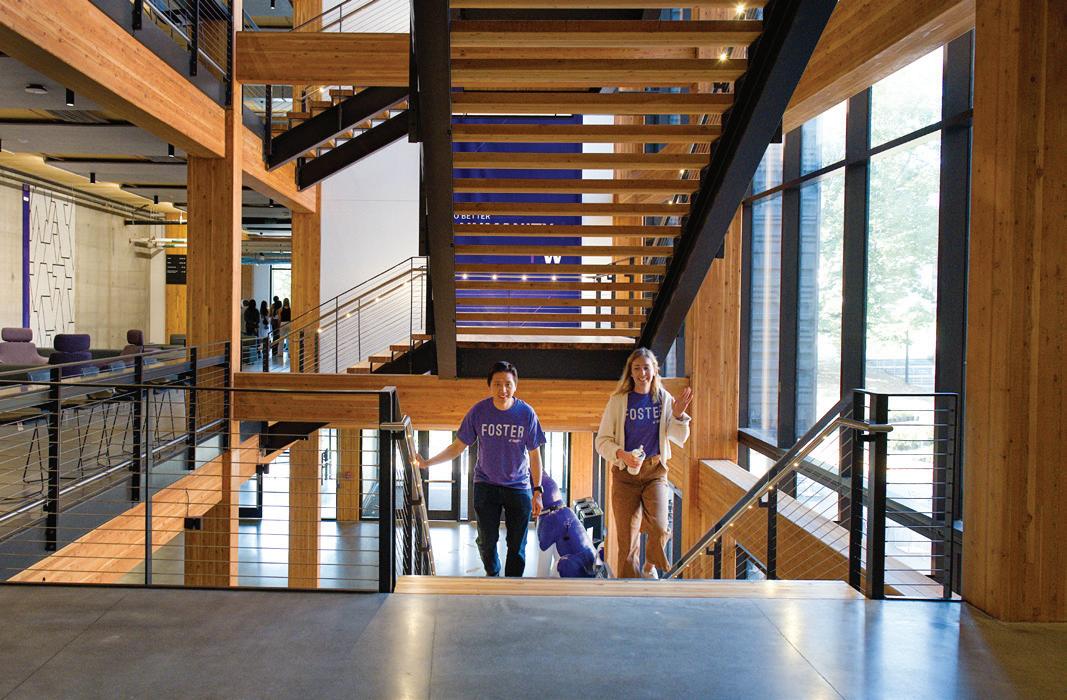FOUNDERS HALL Welcome to


FEATURES DEPARTMENTS
FOSTER BUSINESS



FEATURES DEPARTMENTS
FOSTER BUSINESS
Associate Dean for Advancement
Tahsin I. Alam
Senior Director of Alumni Engagement

Andrew Krueger
10
Welcome
privately funded
3 News
Experience Foster, Up-Lifting, Alaska Airlines Day, Stellar Scholars, Excellence Echelon, Impact Accelerator, Benevolent Dynasty, Inspiring Innovation, Four More Years!, TMMBA @ 20, AIMS @ 60, Champion of Change, Forté Fourteen, Lives of Service, The Buzz is Back!
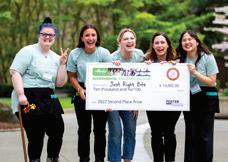
Chief Marketing Officer
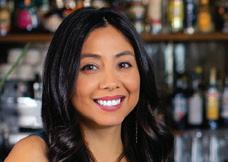
Randy Hyde
Managing Editor
Ed Kromer
Contributing Writers
Kristin Anderson, Melissa Borges, David Fenigsohn, Lauren Kirschman, Andrew Krueger
Photography
Paul Gibson, Matt Hagen
Design a.k.a. design
feeling
24 Faculty
Class of 2022, Cubicle Karenina, Honor Roll, Research Briefs
Foster School of Business Marketing & Communications University of Washington Box 353200 Seattle, WA 98195-3200 206.685.2933
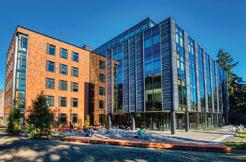

On the Web magazine.foster.uw.edu
Foster Business is published annually by the University of Washington Foster School of Business. The publication is made possible by proceeds from the Ivar Haglund Endowment. No state funds are used in its production.
Change of Address? fans@uw.edu
As Fritzky Chair in Leadership, Joanne Harrell brings vast experience and deep expertise to Foster progress
22 Foster Insights
Foster School faculty experts share research revelations that can help build better work environments
28 Alumni
Comments? bizmag@uw.edu
In September, we officially opened Founders Hall, the Foster School’s stunning new building, with an all-day community celebration. It was an event well worth celebrating—because getting there was not easy. A global pandemic shut down the world just as we were about to begin construction. We weathered the unexpected bankruptcy of our mass timber supplier, a prolonged shutdown of concrete delivery in Seattle due to a strike, and numerous supply chain issues.
Collaborating closely with our UW partners, LMN Architects and Hoffman Construction, we found a way and opened just in time for the academic year. Founders Hall was 100% privately funded by so many of you who gave generously, none more so than a consortium of leaders we call the “Founders” of Founders Hall.
In this magazine, you will see why we’re so thrilled with Founders Hall. It is a marvel of sustainable design that was built with great intentionality towards creating a welcoming and inclusive space, one that invites people in and encourages them to stay. One that builds and nurtures community.
You may have noticed that we talk a lot about community at the Foster School. Who is the Foster community, exactly? This is us, by the numbers:
• 3,388 students enrolled in degree programs, including 2,086 undergraduates, 895 MBAs, 329 specialty masters and 78 PhDs—plus another 625 in minor and certificate programs and 1,500 in Executive Education programs
• 136 faculty, including 92 tenure-track professors and 44 teaching professors
• 206 staff, serving every program, center and academic department
• 60,028 alumni, residing in 76 countries (though 40,946 live in Washington state and 28,460 in King County)
• 3,078 individual donors (over the past year)
• 195 philanthropic corporate partners, plus hundreds more that support experiential learning and provide executives to coach, advise and mentor students, serve on advisory boards, judge competitions, lecture in classes and much more
In the pages that follow, you’ll discover just a few of the myriad collaborations and contributions by members of the Foster community who are striving to be better together, better tomorrow. Come visit! Stroll through Founders Hall, have a coffee at Orin’s Cafe, sit by the fireplace, and feel the energy that is the Foster spirit. A spirit that embodies our guiding purpose:
Together...
We Foster Leaders

We Foster Insights
We Foster Progress
…To Better Humanity
Kind regards,
Frank Hodge Orin & Janet Smith Dean UW Foster School of Business
Orin & Janet Smith Dean UW Foster School of Business
She also sparked an organization that coaches first-generation college grads, co-launched a campaign to encourage communities of color to participate in the 2020 census and election, and co-created the oral history project
Foster’s success is powered by many invaluable corporate and individual partnerships, many of which were on display at the Business Leadership Celebration.
Presenting Partner – T-Mobile
Experience – Costco, EY
Partner – KPMG, Gary & Barbara Wipfler, Zevenbergen Capital Investments
The Foster School’s 30th annual Business Leadership Celebration celebrated transcendent leaders while shining a light on Foster’s myriad experiential learning opportunities that develop the next generation of leaders.
Headliner Brad Smith, the vice chair and president of Microsoft, spoke to the value of experiential education in allowing us to “learn differently,” in conversation with Joanne Harrell (BA 1976, MBA 1979), this year’s Fritzky Chair in Leadership.

Smith also discussed Microsoft’s deep commitment to a carbon-negative and water-positive future, and the crucial importance of meeting the existential and economic challenge of climate change with innovation and optimism.
Distinguished Leadership Awards were presented to Betti Fujikado (BA 1977), co-founder of Copacino Fujikado and Success Cohorts, and Ken Denman (MBA 1986), general partner at Sway Ventures.
The daughter of Japanese Americans incarcerated during World War II, Fujikado led the Copacino Fujikado advertising agency as CEO for 23 years.
“Our Stories Are Your Stories” to counteract anti-Asian hate. She has served as a Foster MBA mentor for many years.
A career leading emerging technologies has led Denman to back tomorrow’s disruptors through Sway Ventures. The former president and CEO of Emotient, Openwave Systems and iPass and senior VP of MediaOne is a director of VMWare, Costco and Motorola Solutions. A former Fritzky Chair, Denman currently serves on the boards of the Foster School, UW Foundation and Seattle Children’s Hospital.
The event, presented by T-Mobile, raised more than $435,000 in support of hands-on learning at Foster.
MBA candidate Rebecca Ballweg spoke on the many indelible experiential elements of her education, especially her recent immersion in the inaugural Race, Culture and Business tour of the American South. Learning first-hand the economics and legacy of systemic racism gave her a fresh perspective and proactive approach in her subsequent internship at EY-Parthenon.
Contributor – Alaska Airlines, Amazon, American Piledriving Equipment, Inc., Susan Bevan, Jason & Stephanie Child, Copacino Fujikado, Crowley Maritime, D.A. Davidson, Deloitte, Neal & Jan Dempsey, Ken & Mary Denman, First Choice Health, Sunny & Prerna Gupta, Charles & Nancy Hogan, Lexdon, LLC, LMN Architects, Microsoft, The Mark Peek Family, Premera Blue Cross, PwC, Shelley Reynolds, Don & Karin Root Family, Success Cohorts, Wells Fargo
Net proceeds from the Business Leadership Celebration will help foster leaders at the Foster School through myriad experiential learning opportunities that enhance coursework. If you are considering a gift to Foster, please visit foster.uw.edu/give.
There, she advised a healthcare client to develop community partnerships as an effective means of increasing diversity in clinical trial participation and improving access to advanced care.
“This is the power of experiential learning at Foster,” Ballweg said. “It forces students to leave the safety of the lecture hall, expand our world and dig our hands into the problems we are hoping to solve.”

At the Foster School’s 19th annual Celebration of African American Achievement, the Emerging Leader Award went to Brooke Spearmon (MBA 2009), the global lead of early career talent experience at Amazon Web Services. Spearmon founded the MBA Business Diversity Club during her time at Foster, and remains deeply involved with the Consulting and Business Development Center with her husband, Shaun Spearmon (MBA 2011).
The Spratlen Legacy Award went to Joanne Harrell (BA 1976, MBA 1979), a former UW Regent who chaired the board’s diversity, equity and inclusion advisory committee. Harrell is a retired senior director of Microsoft and former CEO of United Way of King County. She is serving as the Foster School’s current Fritzky Visiting Chair in Leadership.
The Spratlen Legacy Award was established in 2016 by the Association of Black Business Students in honor of the late Dr. Thaddeus H. Spratlen, the organization’s first faculty mentor and longtime champion of diversity, equity and inclusion at Foster and the UW.
The Foster Faculty is ranked #8 in the world (averaged over the past five years) for research productivity in the top 50 scholarly journals representing every business discipline, according to the latest Financial Times research index.
The Department of Management and Organization is ranked #4 in the world for research productivity over the past five years in the discipline’s eight most influential journals, according to an annual index compiled by Texas A&M and the University of Georgia.
In May, Foster welcomed an old friend back to campus for Alaska Airlines Day. CEO Ben Minicucci and an A-list of Alaska leadership—many sporting Foster degrees—joined Dean Frank Hodge, hundreds of students, the Husky Band and Dubs to celebrate one of Foster’s most impactful corporate partners.

The Department of Information Systems and Operations Management is ranked #5 in the world for research productivity over the past three years in the discipline of information systems by the Association for Information Systems.
The Department of Accounting is ranked #10 in the world for accounting research published in the discipline’s top 11 journals over the past six years and #2 overall in the area of financial accounting, according to the BYU Accounting Rankings.
MS in Taxation – #1 accelerated program in Accounting.com
Master of Supply Chain Management –#4 (#2 public) in QS World University Rankings
MS in Business Analytics – #5 (#3 public) in QS World University Rankings
Hybrid MBA – #5 (#3 public) in U.S. News & World Report
MS in Entrepreneurship – #6 (#3 public) in MIM-Guide
Evening MBA – #10 (#5 public) in U.S. News & World Report
Executive MBA – #12 (#4 public) in Financial Times
Undergraduate – #19 (#9 public) in U.S. News & World Report
Full-time MBA – #21 (#5 public) in Financial Times*
*Foster ranks #3 in aims achieved and #3 in job placement, according to Financial Times
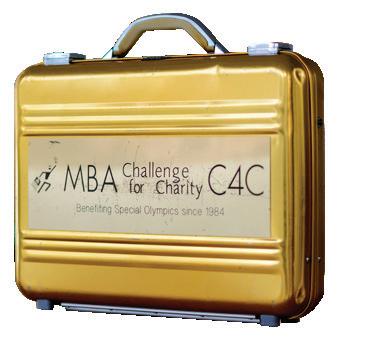
The lexicon of sports has numerous terms to describe the rare feat of winning three consecutive championships. Triple crown. Triple. Treble. Three-peat.
But four straight titles? Now, we’re talking dynasty.
It’s certainly a benevolent dynasty developing at the Foster School, whose MBA students claimed a fourth consecutive “Golden Briefcase” in this year’s MBA Challenge for Charity (C4C).
This annual competition among top West Coast b-schools to volunteer the most hours and raise the most money for local nonprofits went again to Foster MBAs, who raised twice the charitable dollars and logged 11x the volunteer hours, per student, of their closest competition.
The Dean’s Impact Scholar at Foster this year is Teddy Johnson, a clinical associate professor and director of technology development at the UW Institute of Translational Health Sciences who teaches in Foster’s Creative Destruction Lab. In his new role, Johnson plans to work across the UW and Seattle startup community to accelerate research on minority entrepreneurship.

In addition to supporting its core charities—Boys and Girls Clubs of King County, the University District Food Bank and Special Olympics of Washington—Foster MBAs also served Farmer Frog, Black Farmers’ Collective and Refugee Artisan Initiative—and separately raised $1,300 to support displaced Ukrainians through World Central Kitchen.
This sustained success is the product of a strong sense of community and a purpose-driven culture.
“A huge part of our success comes from the way that volunteering is woven into the MBA Program itself,” says former C4C president Alicia Howard (MBA 2022). “I think prospective students are drawn by this energy, too… it is core to the fabric of the program.”

A national program spun out by the Foster School’s Consulting and Business Development Center was named one of this year’s “Innovations That Inspire” by AACSB International— the world’s most influential business education alliance.
Ascend is a partnership between Foster and JPMorgan Chase that convenes and coordinates local collaborations of business schools, community lenders and suppliers focused on accelerating the growth of businesses owned by people of color.
Operating in 12 cities across the United States, Ascend represents an evolution—and expansion—of the CBDC’s M3 Model that addresses systemic gaps in access to management education, money and markets.
Over the past two years alone, Ascend has helped more than 500 businesses win $2.3 billion in contract revenue, raise more than $60 million in financing, and create and retain more than 5,500 jobs. Ascend has already helped 110 businesses owned by people of color grow into multi-million-dollar firms. By 2025, Ascend will help 400 businesses owned by people of color surpass $1 million in annual revenue, 75 exceed $5 million and 25 top $10 million.

The Foster School’s Global Business Center is one of 16 selected to receive a Center for International Business Education and Research (CIBER) grant from the US Department of Education for 2022-2026.
The CIBER program was created to promote the nation’s competitiveness through the development of a globally competent workforce. Foster’s center plans to build on the school’s strong foundation in international business education and research to launch new programming focused on global business resilience, training for export competitiveness and cross-cultural competence (through a lens of diversity, equity and inclusion).
The CIBER program benefits more than 6,000 students, faculty and community members each year. It allows the center to deliver experiential learning opportunities, including study abroad, case competitions and consulting projects, while simultaneously supporting leading-edge global business teaching and research.
Foster’s GBC has been recognized as a CIBER since the program’s founding in 1991.

The Foster Alumni Network is 60,000+ alumni strong—and we want to help you stay connected! Engage in lifelong learning, network with fellow alumni, mentor students and more. Scan the QR code to update your contact information, and we’ll be in touch!
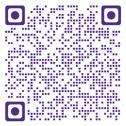
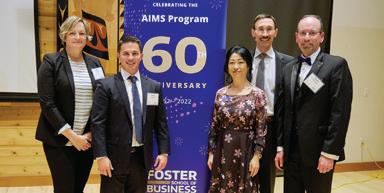
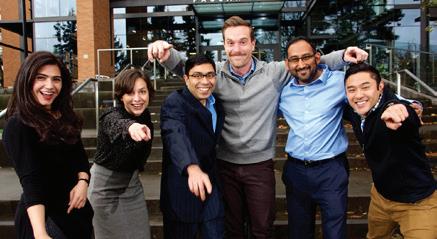
As a new century emerged, breakthrough technologies began integrating into every aspect of business and life.
For the group of 43 students setting out to earn their Technology Management MBA (TMMBA) at the Foster School, tech was already a passion.
Over TMMBA’s first 20 years, that original cohort has grown into a network 1,500 alumni strong—each increasing the impact and meaning of their work through rigorous leadership development.

TMMBA has equipped grads “to level up and bridge the gap between tech expertise and business acumen,” says program director and alumna Erin Aselas Duran (MBA 2010), who adds that the program is built to innovate, whatever the next 20 years bring.
A historic leadership development partnership of Foster and Boeing celebrates six decades
The year was 1962, long before the emergence of Microsoft, Starbucks or Amazon.
The Boeing Company, the essential engine of the Northwest economy, struck a partnership with the UW College of Business (now Foster School) to launch the Aerospace Industry Management Seminar (AIMS). The two-week intensive program, delivered by Foster Executive Education, equips promising Boeing employees with the principles of agile leadership and change management, as well as the tools to lead efficient design and manufacturing, supply chain, operations management and financial performance.
This joint venture is the longest-running executive education partnership between an academic institution and a Fortune 100 firm—with 4,143 alumni and counting. And it’s still innovating after 60 years.
As the Foster School’s new associate dean for inclusion and diversity, Michelle Purnell-Hepburn (BA 1979, MBA 1982) brings extensive leadership experience in the nonprofit foundation and finance sectors and, especially, the advancement of diversity, equity and inclusion (DEI).

She joins Foster from the Seattle Foundation, where she served as director of DEI. Before that, she held a series of leadership positions at Salal, Seattle Metropolitan and Group Health Credit Unions. She currently serves on the boards of Capitol Hill Housing and Community Roots Housing.
Purnell-Hepburn has deep ties to Foster. She earned BA and MBA degrees here and was president of the Association of Black Business Students during her grad school days. Last year, she taught a new class entitled “The Power of Access: Impact Lending to Underserved Communities.” In 2021, she was awarded the school’s Spratlen Legacy Award for embodying her credo: “lift as we climb.”
Foster alumni receive UW Excellence Awards for their extraordinary commitment to community

Michael Verchot (MBA 1995), the co-founder and long-time director of Foster’s Consulting and Business Development Center and the nationwide Ascend network, received this year’s UW Distinguished Service Award for his tireless efforts to accelerate the growth of businesses—both locally and nationwide—that are owned by people of color, women, veterans and LGTBQ+ entrepreneurs. Verchot received the 2021 David B. Thorud Leadership Award.
As a prelude to their Foster experience, 14 incoming MBAs from the Foster School’s class of 2024 traveled to Los Angeles last summer to participate in the Forté Foundation conference. The foundation is dedicated to launching women into fulfilling and significant careers through access to business education, professional development and a network of accomplished professional women. Foster is a sponsor of the Forté Foundation.
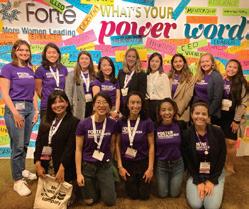
David N. Stone (BA 1968), a retired Signal Corps officer in the US Army, received the UW Distinguished Alumni Veteran Award. After modernizing the Army’s vital communication structures during his decorated 20-year military career, Stone continued to support the public good as a government advisor. At the UW, he helped establish UW Veterans Appreciation Week and the Office of Student Veteran Life. A former trustee of the UW Alumni Association and member of the legislative advocacy program UW Impact, Stone is a Laureate-level supporter of the UW. Stone and his wife, Marcie, shared the UWAA’s 2021 Golden Graduate Distinguished Alumnus Award.

After creating innovative remote experiences for the past two years, the Buerk Center for Entrepreneurship’s new venture competitions blasted back in person this year—with an electrifying buzz in the air as student entrepreneurs and judges danced again in a pageant of persuasion.
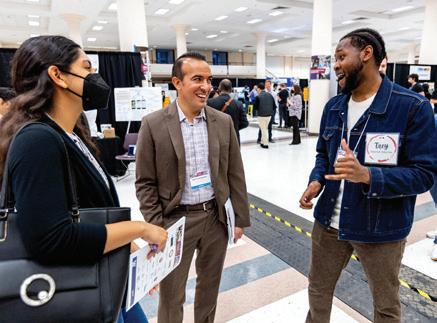
Here are this year’s biggest winners:
The 25th annual Dempsey Startup Competition awarded its $25,000 Herbert B. Jones Foundation Grand Prize to OnDeck Fisheries AI, a team of students from UBC and Simon Fraser who created an automated monitoring system to address declining global fish stocks.
CathConnect, a spinout of the UW’s Engineering Innovation in Health Program, won the $15,000 BECU Second Place Prize for its device that improves the safety of urinary catheters. The $10,000 WRF Capital Third Place Prize went to OneCourt, a team of UW students touting a unique sensory experience that makes sports media more accessible and engaging for the visually impaired. And team inSTENT Connection, also from the UW, won the $7,500 Friends of the Dempsey Startup Fourth Place Prize by creating the first naturally absorbing stent for patients undergoing GI tract surgeries.
as a sustainable protein base. The $5,000 Starbucks Third Place Prize went to Arctic Biotech Oath, from the University of Alaska, for their bio-mining process that sustainably extracts rare earth elements using microorganisms.
The Holloman Health Innovation Challenge issued its $15,000 WRF Capital Grand Prize to inSTENT Connection. Judges awarded the $10,000 Herbert B. Jones Foundation Second Place Prize to CathConnect. And the $5,000 Fenwick & West Third Place Prize went to the UW team behind EquinOx, creator of a pulse oximeter that corrects skin-tone inaccuracies in real time.
The Buerk Center presented its first UW Alumni Entrepreneur of the Year Award to Amber Ratcliffe (MBA 2003), co-founder of NanoString Technologies (Grand Prize, 2003 Dempsey Startup).

At the Alaska Airlines Environmental Innovation Challenge, the $15,000 Alaska Airlines Grand Prize was awarded to Catalytic Carbon, a partnership of UW aeronautics, informatics and entrepreneurship students behind a process that dramatically increases the percentage of plastic that is recyclable.
The $10,000 Herbert B. Jones Foundation Second Place Prize went to Just Right Bite, a team of MS in Entrepreneurship students developing a suite of pet foods that use insects
And Washington Research Foundation announced a $1 million endowment to establish a new student innovation fund through the Buerk Center. For more than three decades, WRF has supported impactful student innovation and entrepreneurship at the UW.
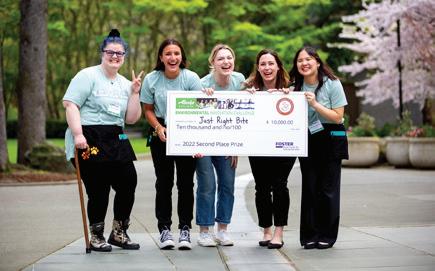
The first thing to catch your eye might be the river of copper salmon swimming “upstream” from floor to floor in metaphoric transformation. Or maybe it is the soothing cascade of the refurbished Fountain of Reflection. Or the warm tones of structural wood visible at every facet. Or the brilliance of natural light that floods through vast windows and permeates the premises. Or the commingling of voices as they transit the grand central staircase, which runs like an essential artery up and down the heart of the building.
Founders Hall, the Foster School’s new privately funded, 85,000-square-foot facility, is like no other on the UW campus. While bearing a family resemblance to neighboring PACCAR and Dempsey Halls, Founders presents a unique marriage of design and purpose—a most successful merger of natural and
built environments on a campus renowned for its architectural diversity and verdant landscape.
Founders Hall is a model of sustainable design and construction. A cathedral of collaboration. An incubator of innovation, an accelerator of ideas, a convergence of team projects, case solutions and business plans. It is a forum, a gathering spot, a hangout. A place to learn, express, engage, brainstorm, formulate, ideate, implement, celebrate. A place to honor the past and create the future.
Intentionally built upon bedrock principles of sustainability, artistry, collaboration and community, Founders Hall embodies the fundamental notion that we, in the Foster community, are better together.
Here is a brief look inside this multifaceted, multipurpose masterpiece of form, function and feel.
The greenest building on the UW campus, Founders Hall has been designed to achieve a 76% reduction in cumulative carbon emissions and to use 70% less energy and 53% less water than a comparable facility built with conventional means and materials.
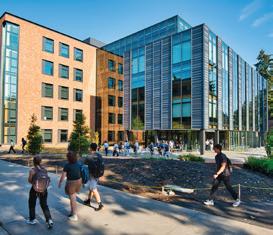
This begins with the structural mass timber of which Founders Hall is constructed. The beautiful composite hardwood is sourced from sustainably managed forests, its manufacturing leaves a comparably minimal carbon footprint, and it continues to sequester excess carbon from the atmosphere indefinitely, even after construction. This carbon capture has been calculated at 1,000 tons by Foster’s cleantech partner Aureus Earth, which demonstrates how to reduce the “green premium” of building with mass timber by selling credits on the developing carbon market.
Other eco-elements include ample daylighting via massive windows, motion-activated LED lighting, low-flow plumbing fixtures, drought-resistant landscaping and a natural cooling system of operable windows and ceiling fans that inhales and circulates evening air.
The Foster School’s new privately funded facility is a model of sustainable construction, collaborative learning and community building

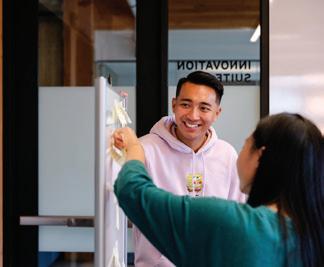
The artistry of Founders Hall only begins with its ubiquitous exposed hardwood and abundance of aesthetic flourishes. Original art installations are exhibited throughout the building and grounds.
Two commissioned works by prominent local Native artists honor the heritage of the land on which the Foster School stands. “Life of the Salmon,” by Tulalip-Tlingit artist James Madison, traces the epic upstream run of the sacred fish in the form of polished bronze casts embedded in concrete floor. “Salish Journey Through Water,” a vibrant suite of paintings by Shaun Peterson (also known as Qwalsius) of the Puyallup Nation, depicts important symbols of the Coast Salish peoples’ identity that are connected by the motif of water.
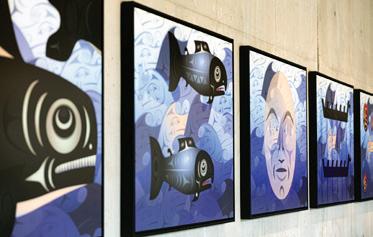
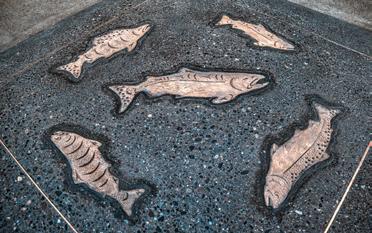
And the historic “Fountain of Reflection,” forged by the world-renowned Northwest artist George Tsutakawa, has been lovingly restored and resettled in the plaza outside Founders Hall, where it offers a calming respite for passersby along one of the busiest corridors on campus.
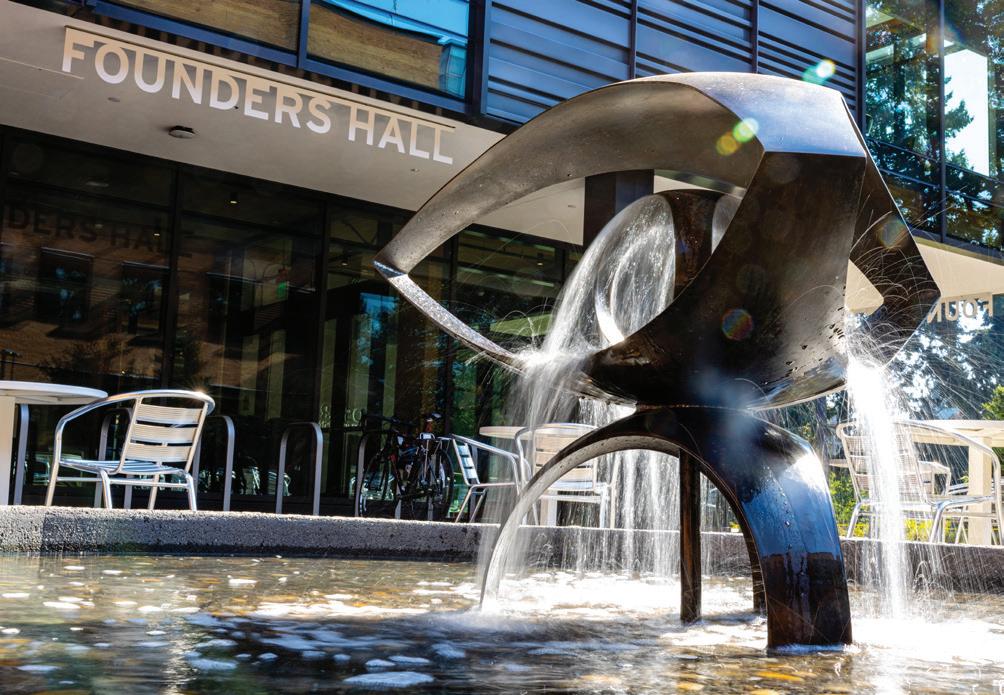
“The purpose of the Foster School is to bring communities together to better humanity through business. Founders Hall—with its connections to the Pacific Northwest forest products industry, its Native art, its significantly reduced carbon footprint and its intentional design fostering community and collaboration—is an example of how we are living our purpose as a forward-thinking business school.”
FRANK HODGE , Orin and Janet Smith Dean
A salient spirit of community is woven into every fiber of Founders Hall. This starts with the 5th floor Founders Gallery, which honors the lives and leadership of a consortium of transformational donors—the “Founders” of Founders Hall—who supercharged the private funding of its $79 million construction.
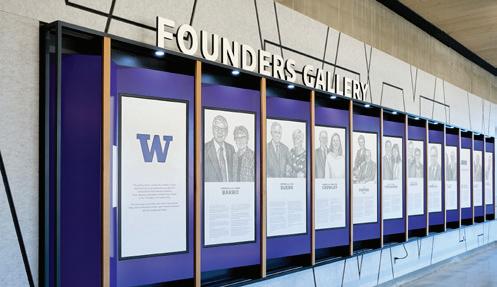
The community ethic echoes throughout the building. Ample space has been dedicated for gatherings both formal and casual, from an outdoor plaza of café tables and comfortable benches to the Atrium and Debra and Arnie Prentice Commons, which beckon chance meetings and spontaneous conversations. The Dick and Laurie Anderson Alumni Suite is the new headquarters for post-graduate engagement.
The Thaddeus H. Spratlen Lounge for Inclusion and Diversity is an event space, a hangout and a welcoming foyer to Foster Diversity Services. And Founders Gallery leads to the flexible Peek Family Forum, which opens to the majestic Wipfler Family Terrace and views to Denny Yard and Mount Rainier.

It’s all tied together by the grand central staircase, an architectural marvel of wood and windows that winds the length of the building like a helix-shaped hub of human interaction at every spacious landing.

Intentionally designed to foster collaboration among students, faculty and staff, Founders Hall features 28 team and interview rooms, and four executive conference rooms, each equipped with state-of-the-art technology. Two 135-seat tiered classrooms facilitate in-class breakout sessions with turn-to-team functionality.


The “Center for Centers” is Foster’s new headquarters for experiential learning, and home to the Buerk Center for Entrepreneurship, Global Business Center, Consulting and Business Development Center, Center for Leadership and Strategic Thinking, Product Management Center and Creative Destruction Lab. The Innovation Suite serves as a dedicated idea incubator. The Jack and Ann Rhodes Professional Sales Program serves students from around the UW. Founders Hall is also the home to Foster’s degree program offices and career services.
 Collaboration images by Tim Griffith/courtesy of LMN Architects. Other images by Paul Gibson and Matt Hagen.
Collaboration images by Tim Griffith/courtesy of LMN Architects. Other images by Paul Gibson and Matt Hagen.
A consortium of leadership donors has made possible the construction of Founders Hall
As in that most iconic symbol of American collaboration, the barnraising, multitudes of the Foster School community contributed to the construction of Founders Hall. But none more so than a consortium of leadership donors who provided significant financial support that brought to life this exceptional final piece of Foster’s world-class campus.
These are the “Founders” of Founders Hall.
Chuck Barbo (BA 1963) is the co-founder of Shurgard Storage Centers. Linda Barbo is a past regent of Pacific Lutheran University.

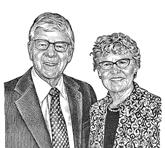
The Barbos have dedicated themselves to encouraging others in life and in entrepreneurial spirit. Their philosophy—with friends, family or business associates—is to address positive or negative situations by personally relating to others through sharing their own stories and experiences along the way.
Artie Buerk (BA 1958) is a foundational Seattle entrepreneur, investor and builder, and founder of Montlake Capital. Charlene “Sue” Buerk (BA 1974) has worked in education, government, finance, public radio and athletics. Both have served the UW Alumni Association.


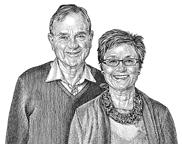
The Buerks believe that leaders are visionaries, proactive listeners and goal-setters who begin with an end result in mind. The paramount leadership ability is self-leadership.
Mike Garvey (BA 1961, JD 1964) launched the law firm of Garvey Schubert Barer and invested in many successful companies before he and Lynn Garvey founded Saltchuk Resources, a family owned holding company composed primarily of maritime transportation businesses.
The Garveys believe that working in business is a noble occupation that should give us all pride. For it is business that has been the overriding force that has created the continuing growth of the world’s prosperity.
Jim Jiambalvo, an honorary founder, served as dean of the Foster School of Business for 14 years, leading the construction of PACCAR and Dempsey Halls, the school’s naming, and an unprecedented rise in the national rankings—earning him the distinction of “Dean of the Year” from Poets & Quants.
He attributes this success to a focus on fundamentals (outstanding faculty, staff, students and facilities), listening to the advice of highly accomplished business advisors, and the unwavering support of his wife Cheryl.
After immigrating to Canada and the United States upon expulsion from his native Uganda by the dictator Idi Amin, Firoz Lalji founded Kits Cameras and the global IT provider Zones, LLC. Najma Lalji headed accounting for the family’s Fana Group of real estate investments.
The Laljis like to say they are living the American Dream, but that dream has been a team effort—it takes talented, engaged, empowered people with a shared vision to make your dreams come true.
Tom Crowley (BA 1985) is the CEO of Crowley Maritime Corporation, the family business founded by his grandfather in 1892. Christine Crowley, a transport industry veteran, serves on the Crowley Maritime Board of Directors.
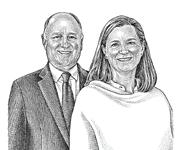
The Crowleys are guided by a simple suite of credos: treat others the way you’d want to be treated; be prepared to fail (and to let your kids fail) in order to learn, grow and build confidence; keep a sense of humor; don’t take life too seriously; and don’t lose sight of the bigger picture.
The Foster Family
Albert Foster (BA 1928) co-founded the regional brokerage firm Foster & Marshall in 1938. His wife, Evelyn Foster (BA 1932), was a key figure in the emerging arts and cultural life of Seattle. Their son, Michael G. Foster, grew Foster & Marshall into the largest brokerage firm in the Pacific Northwest, and negotiated its sale to American Express in 1982.
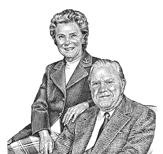
Together, they established The Foster Foundation in 1984, which has provided unparalleled financial support to the school that bears the family name.
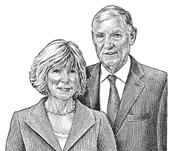
Gary Furukawa (BA 1981) came up through accounting and investment banking before becoming an angel investor in Amazon and founding Freestone Capital Management.
Longtime supporters of the Foster School, the Furukawas share a suite of philosophies for leadership and life: exercise is the greatest free lunch; curiosity and continual learning make life more interesting; humility is the key to business success; and personal relationships are the most important things in life and in business.

Pacific Coast Banking School’s National Graduate School of Banking, the nation’s premier such institution, has been educating bankers and creating leaders in the financial services industry since its founding in 1938.

Like the timbers in Founders Hall, the PCBS partnership with the University of Washington and the Foster School of Business is strong and made to last. PCBS leadership is proud to share a mutual vision of preparing responsible and accountable financial business leaders to help build a bright future.
Wayne and Christine Perry
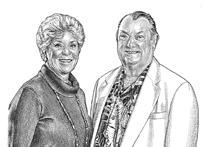
Wayne Perry (BA 1972) is a founding father of the cellular industry, serving in principal leadership roles at McCaw Cellular Communications, AT&T Wireless, NEXTLINK and Edge Wireless. Christine Perry (BS 1972) is an educator and, along with Wayne, an active leader in schools, church, Little League and the Boy Scouts of America.
The Perrys support the Foster School because of its dedication to delivering the highest scholarship and developing character and leadership— while fostering the entrepreneurial spirit that so benefits the community.
Roy Simperman (MBA 1970) was an engineer at Boeing and Weyerhaeuser before leading AudioControl, co-founding the Internet’s first digital photography company and launching Semaphore Corporation. Frances Simperman taught special education and directed cytology at Northgate Hospital before founding Printex Press.
The Simpermans, supporters of education at every level, believe that the key to effective leadership is trust. And trust requires integrity, good judgment and common sense.
Foster students often embark on international study tours and exchanges to expand their perspectives. This year, some experienced life-changing travels without even leaving the United States.
A group of MBAs embarked on an immersive journey over spring break to learn about race, culture and business in the American South.
The program was created by Ed deHaan, the Gerhard G. Mueller Endowed Professor in Accounting, who was exploring how he could become a more impactful educator through the lens of diversity, equity and inclusion (DEI).
“I thought, let’s go to the South,” says deHaan, a Louisiana native. “Let’s understand the history of racial disparity in the country.”
The tour was facilitated by Foster’s Global Business Center and curated by Seattle-based Sankofa Impact. The 20 participating students experienced an emotional history lesson on the economics and legacy of slavery—from the transatlantic slave trade to the Civil Rights and Black Lives Matter movements to the modern business focus on DEI.
The seven-day whirlwind visited key sites along the Civil Rights Trail, from Louisiana (New Orleans) to Mississippi (Jackson and Clarksdale) to Tennessee (Memphis) to Alabama (Birmingham, Montgomery and Selma).

Pre-trip class sessions equipped the students with contextual knowledge and the business case for DEI—and built community, which would prove vital.
“We were talking about really heavy stuff, and it takes a certain amount of vulnerability to be able to share how you’re personally impacted by prejudices or to admit where you haven’t had experiences and how you have room to grow and learn,” says student co-lead Cameron Boyd (MBA 2022). “It was important to have a sense of safety among the students.”
The trip began with a visit to the Whitney Plantation in Louisiana—the only plantation museum focused on the lives of enslaved people—to understand the economics of enslavement.
This, Boyd says, required exploring some critical questions: “What kind of wealth did this slave trade generate, and why was that such an important piece of the American economy? How did generating all that wealth and then excluding some people from the benefits inform and impact the way that our society is set up now?”
One of the most memorable visits was to the Lower Ninth Ward neighborhood of New Orleans. Nearly 17 years after the devastation caused by Hurricane Katrina, the mostly Black neighborhood has been unable to fully rebuild.
An immersive study tour through the American South leaves Foster MBAs feeling educated—and inspired
Student co-lead Jerrell Patacsil (MBA 2022) recalls feeling like Katrina had hit just a few weeks ago. “It is amazing to think about how long it’s been,” he says, “and they’re still experiencing the remnants.”
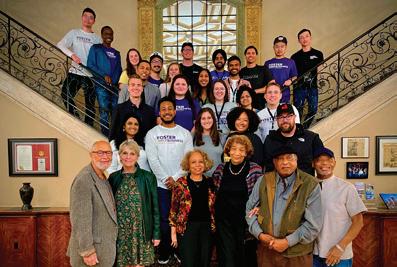
In the aftermath, the ward’s population fell by 71%. Retail and wholesale companies decided not to rebuild, which left Burnell’s Market, held together by Burnell Cotlon, as the sole provider of groceries and basic necessities in the area.
Though the students wanted to help Cotlon build a better business plan, they reflected on the concept of “saviorism” and ways to become more effective allies.
“I think it’s important for anyone who is an ally or cares about this cause to meet people where they are by having empathy and understanding,” says Sasha Duchin (MBA 2022).
Another resonant experience for Duchin involved the controversy over Confederate-era monuments. And, in particular, one largerthan-life statue that stands in Montgomery.
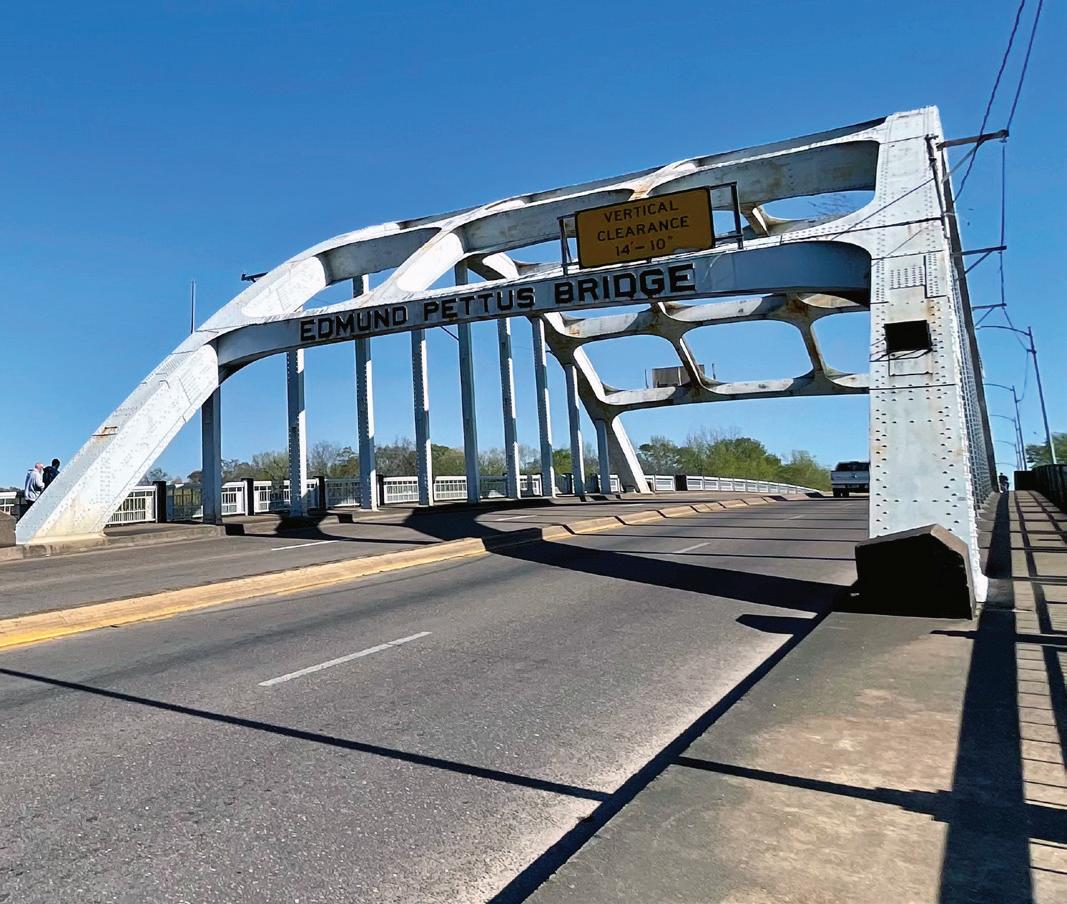
It depicts Dr. James Marion Sims, known as the “father of gynecology” in the US. To achieve this title, though, Sims performed experimental medical procedures without anesthesia on Black women he owned as slaves.
“I told my mom and sister about it, and they had no idea,” says Duchin, whose family works in medicine. “That really hit home from that point of changing the narrative.”
The following day, Duchin and a group of classmates visited Michelle Browder’s newly installed “Mothers of Gynecology” counter-monument that honors three of Dr. Sims’ enslaved subjects: Anarcha, Lucy and Betsey.
Duchin believes that it’s time to change the narrative taught in school to get a full understanding of American history and its impact on society today. She says that being present in the American South has inspired her to incorporate DEI awareness and practices into her consulting career and to teach wellness techniques to incarcerated people.
In his own nascent career, Patacsil plans to bring consulting and capital resources to underserved communities. He recalls meeting with Norman E. Barnum IV, the CEO of the New Orleans Business Alliance, who energetically spoke to the group about driving growth and economic improvement through businesses. “Business has the opportunity to create so much growth and change and economic prosperity, and so this trip, for me, really solidified the need for that,” says Patacsil.
“If there’s one thing I got out of the trip, it’s hope.” n The Race, Culture and Business tour will continue in 2023.
It is no small feat to launch a cutting-edge entrepreneurship program in the teeth of a global pandemic.
But after conducting business online for much of its first year in existence, Seattle’s Creative Destruction Lab (CDL) was finally able to convene its first in-person summit of founders, mentors and students at the Foster School of Business last spring.

“We didn’t even exist a year ago,” marveled CDL-Seattle site lead Emer Dooley, an affiliate instructor and Charlene M. and Arthur W. Buerk Endowed Faculty Fellow at the Foster School.
The assemblage before her was worthy of marvel. Packed into a PACCAR Hall classroom were the creators of 11 promising early stage companies built around computational health innovations with massive market potential (the site’s initial focus), hailing from Seattle and as far away as London and Singapore.
They spent an intensive day absorbing the wisdom of 25 mentors—a veritable who’s who of data-driven healthcare operators, scientific leaders, entrepreneurs and investors—while a rapt audience of students and CDL founding partners observed from the gallery.
What emerged from this hothouse was a kind of entrepreneurial alchemy, a collaborative crystallizing of objectives and a focusing of go-to-market strategies.
No less than you’d expect from a program founded on the same entrepreneurial principles that it preaches.
CDL-Seattle is the third US location of Creative Destruction Lab, an international nonprofit accelerating the growth of seed-stage science and technology companies that have the potential to scale massively.
Based at the Foster School of Business, CDL-Seattle is a partnership with Foster, the College of Engineering, the Paul G. Allen School of Computer Science & Engineering and CoMotion, the hub for marketing UW innovations.
A twist on the conventional entrepreneurial accelerator, CDL-Seattle provides participating founders with world-renowned professional mentors, guidance to set and meet key milestones, opportunities to raise capital and business development support from students in Foster’s parallel CDL course.
In return, the entrepreneurs surrender no equity and pay no fees. CDL is financed through private philanthropy and corporate partnerships.
The program is built around five concentrated sessions, spaced at eight-week intervals.
The April meeting elicited a mix of blunt analysis, collaborative coaching and passionate debate. It began with a morning of speed-consulting, pairing founders and mentors to pinpoint strategic objectives that are achievable on a realistic timeline— realistic if you believe, as participating CDL founding partner Neil Wainwright asserted, that “a founder has 168 hours in a week.”
The afternoon unfolded with the intensity of a tribunal, as the mentors deliberated hotly on each company’s merits and flaws in the most candid of terms.
Dooley believes that this kind of unvarnished evaluation is the secret of CDL’s success. It is a room full of immensely accomplished friends and allies—who will tell you precisely what they think.
“It’s invaluable for the founders to hear this,” she says.
In the end, the mentors decided who—if anyone—will work with each company until the next session. Those without takers are out of the program, the natural attrition of an exacting process.
A few days after the April meeting, the CDL class met to debrief and discuss what they had witnessed. By now, this collection of Foster MBAs, entrepreneurship undergrads and PhD candidates in STEM fields had become emotionally vested in these startups.
That’s because the three-quarter course they enrolled in is like no other. It began with a crash course in high-tech entrepreneurship facilitated by instructors Benjamin Hallen, an associate professor of strategy and entrepreneurship and the Longbrake Endowed Professor in Innovation at Foster, and Teddy Johnson, the director of technology development at the UW Institute of Translational Health Sciences and Dean’s Impact Scholar at Foster.
Then each of the students embedded with one of the startups in the CDL cohort. And that’s where the real learning began.
“It’s a great opportunity for students to work closely with these high-aspiration ventures built around technological innovations,” explains Hallen, “while also getting to see the process of the founders engaging with these world-class mentors who bring invaluable judgment and wisdom.”
On the immersion side, the students roll up their sleeves and roll out their expertise to help these technical founders develop their astounding innovations into viable businesses.
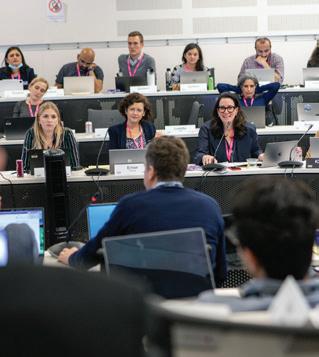
“How you take an idea all the way to something competing is fascinating,” said Jonathan Bannick (BA 2016, MBA 2022), now a strategy consultant at the bioscience consulting firm ZS. “Being able to plug in at this very early stage, when these big strategic decisions are being made, has made a big impact on my understanding the life cycle of these companies.”
On the observation side, Bannick and his classmates experienced the often-messy intersection of expert advisors, potential investors and green entrepreneurs as they fine-tune business models, find sufficient funding and, ultimately, finesse their way into the market.
“Having a front-row seat to watch these incredibly accomplished mentors provide guidance to the venture founders is just priceless,” said Writu Kakshapati, a Foster Evening MBA who daylights as an assurance manager at Frost & Company. “The program has provided a powerful toolset to apply in my career.”
The program may have altered the career of Danielle Faivre, a doctoral candidate in genome sciences working toward Foster’s Technology Entrepreneurship Certificate, who came in wary of early stage ventures. “Now that I have some experience with startups and gained some understanding of entrepreneurship,
I see the benefits and feel the excitement,” she said. “I would say it is definitely now a question of when I will join a startup instead of if.”
The classroom discussion following session 3 became a forum on the program’s process. CDL-Seattle is a pressure cooker. And these students have felt the steam on their faces.
Johnson suggested that one big takeaway from the experience should be the essential role of humanity—even in ventures involving big data, AI and machine learning. People make decisions. And emotions matter.
That’s why he likens Creative Destruction Lab to the most intense game show ever… “like it was created by Chekhov.” n
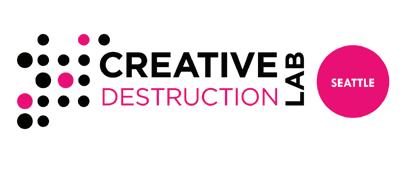
CDL-Seattle is a product of the UW Innovation Roundtable and powered by numerous founding partners, including veteran investors Artie Buerk (BA 1958) of Buerk Dale Victor, Neal Dempsey (BA 1965) of Bay Partners, Bill McAleer of Voyager Capital, Rob Short of Microsoft, Steve Singh of Madrona Venture Group, Arnie Prentice of Kibble & Prentice and Ken Birdwell of Valve. Microsoft, Washington Research Foundation, The Foster Foundation and the Allen Institute for AI are corporate partners.
In addition to enrolling a second cohort of computational health startups, this fall CDL-Seattle added an industry stream supporting early stage companies in advanced manufacturing.
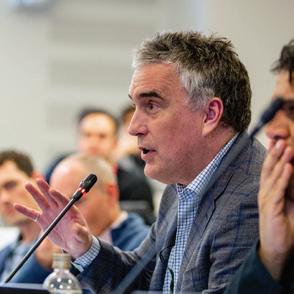
This year’s Edward V. Fritzky Visiting Chair in Leadership—Joanne Harrell (BA 1976, MBA 1979)—is a familiar face at the Foster School, the University of Washington and across the region.
A most-accomplished First Lady of Seattle (she’s married to Mayor Bruce Harrell), Harrell brings to Foster vast experience and deep expertise, plus a record of creating public-private partnerships that create innovative solutions to urgent civic and societal issues.
After a successful career in telecommunications, Harrell served as president and CEO of United Way of King County before joining Microsoft. Over two decades at the tech giant, she led teams in
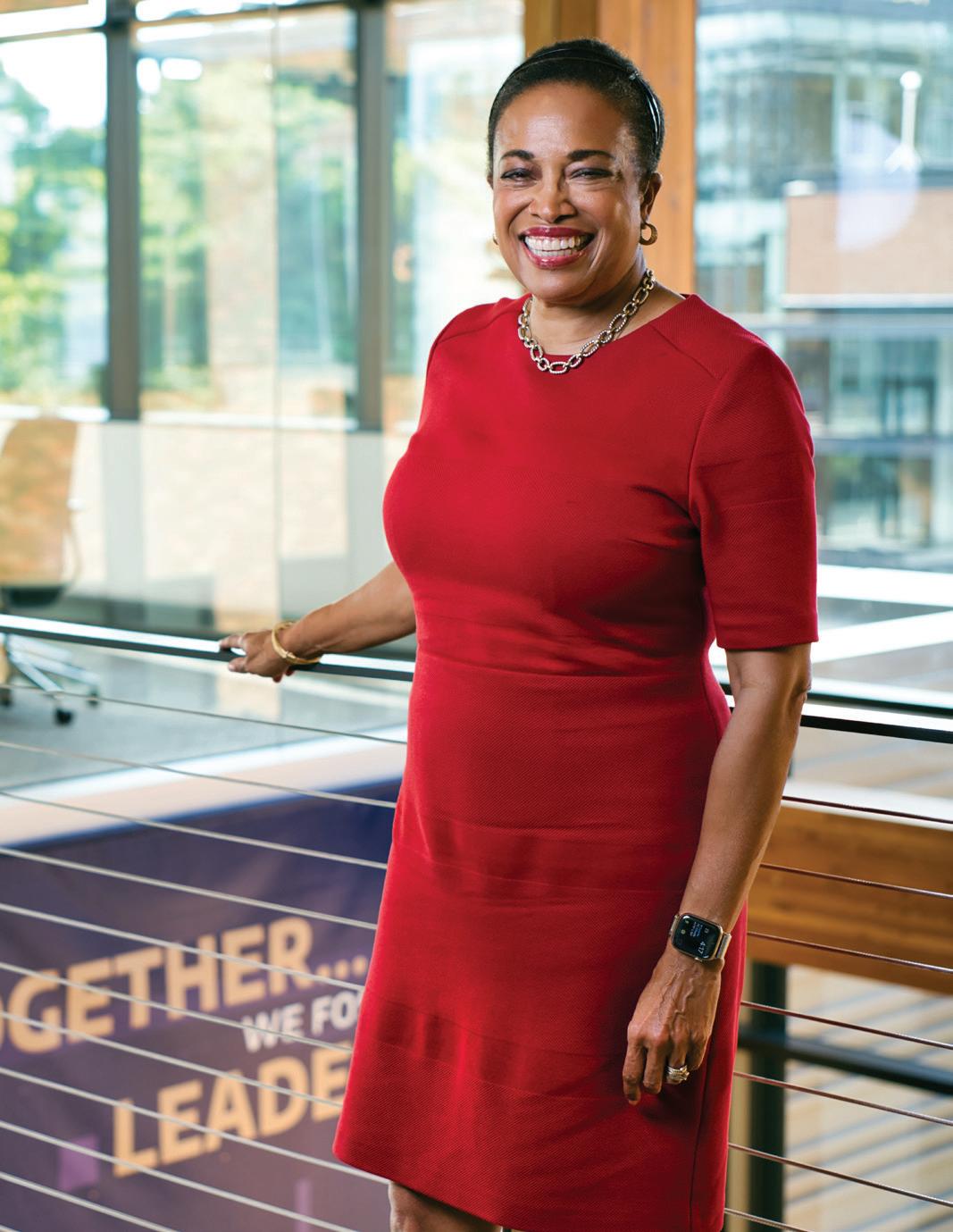
sales, marketing and services focused on enterprise, public sector and original equipment manufacturing customers and partners.
Harrell currently serves on the board of directors of HomeStreet Bank and HomeStreet, Inc., where she chairs the nominating and governance committee. She also chairs the board of directors at Equal Opportunity Schools and is a member of the Fred Hutch board of directors.
As a UW Regent from 2009 to 2022, Harrell served on the finance and facilities committee and chaired the academic and student affairs committees. She was the lead founding Regent for
As Fritzky Chair in Leadership, Joanne Harrell brings vast experience and deep expertise to Foster progress
the diversity, equity and inclusion advisory committee, and remains an active member of the board’s real estate and legislative affairs committees.
Harrell was inducted into the UW Department of Communication Hall of Fame in 2009 and was named Distinguished Alumna in 2013. In 2017, Joanne and Bruce Harrell were co-recipients of the UW’s Charles E. Odegaard Award for Outstanding Community Service and Diversity. And this year, Joanne received the Foster School’s Spratlen Legacy Award.
Here is an excerpt of her conversation with Andrew Krueger, senior director of alumni and media engagement at the Foster School.
Andrew Krueger: Given all of your existing commitments and opportunities, why did the Fritzky Chair in Leadership appeal to you?
Joanne Harrell: One, I love the UW. Another reason is that I have huge appreciation for the education that I received at the Foster School. It has been pivotal in my success throughout my career.
Also, there are a number of people at the Foster School with whom I feel a sense of connection. Dean Emeritus Bill Bradford, for instance, I have known since he came to Foster. Although he has passed, Emeritus Professor Thaddeus Spratlen is still close to my heart. Michael Verchot is another. The work he is leading at the Consulting and Business Development Center is so important! Dean Hodge is also high on my list of Foster folks.
Finally, I love working with the students and appreciate this opportunity to partner with them.
What role has mentorship played in your life, and who are some your mentors?
Honestly, my first mentors were the people that I grew up with all around me. I was blessed with having had a great set of role models in my home and family environment.
Moving to the corporate world, I had a number of particularly good bosses and corporate leaders as mentors. Andy Smith, who was the president of Pacific Northwest Bell, was just outstanding.
When I was in the nonprofit world, leading United Way, Jeff Brotman, the founder of Costco, was instrumental. Then at Microsoft, there were a number of folks including Steve Ballmer, who was a key sponsor.
I mention sponsorship because I have found that sponsorship is equally impactful. It is important for leaders to pay attention to and connect with young, up-and-coming talent to support their growth and career development.
Do you feel like you learn as much from the people that you are mentoring or sponsoring as they do from you?
Yes. I think the best relationships—between mentors and mentees—are bidirectional and mutually beneficial. These types of connections have more energy and higher impact for both parties.
At the beginning of 2020, Dean Frank Hodge named our first associate dean for inclusion and diversity and introduced Foster’s ID (inclusion and diversity) Program. From what you’ve experienced, are we heading in the right direction?

Oh my goodness, yes! I admire Dean Hodge’s open, reflective approach. In working with him over the past six months, I have seen a leader who tries to hear all voices and makes thoughtful decisions.
Throughout Foster, there seems to be a culture of being open, inclusive, nonjudgmental, and listening to understand. When I look at the oars that are in the water, it feels like Foster is on the right course.
I feel appreciated and respected for what I bring to the school. That’s really what inclusiveness comes down to: Do we feel valued, appreciated and respected? I feel this here, and it feels good.
STEM (science, technology, engineering and math) degrees get most of the attention in discussions about higher education these days. Does business deserve more attention? People tend to forget that many elements of business are very STEM-related.
The best business thinkers understand the qualitative and the quantitative elements of issues and can put these together in ways to facilitate creation, interpretation and leverage of human systems.
Some of the strongest leaders I have worked alongside are people who have a natural science background and then realize they want to focus on and understand business. On the other hand, I have also known liberal arts majors who have become great business leaders. My sense is that the best leaders are multi-dimensional and capable of leveraging natural systems across multiple scenarios.
The beauty of business is that you can come from the left or you can come from the right and you can put it in the middle and it all comes together just fine. n
“I think the best relationships—between mentors and mentees—are bidirectional and mutually beneficial. These types of connections have more energy and higher impact for both parties.”Joanne Harrell speaks with Foster MBA students.
 by ED KROMER
by ED KROMER
We spend half—or more—of our waking hours at work. So, we all have a vested interest in improving the environment in which we spend all those precious hours.
The Foster School of Business does, too. And this very topic was at the heart of a special spring event called Foster Insights, organized by Chris Barnes, a professor of management and Evert McCabe Endowed Fellow at the Foster School.
Five of his faculty colleagues offered expert guidance to a more effective and meaningful work life.
Stacia Jones traced the unbroken history of racial inequity in America from enslavement to emancipation to Jim Crow to Civil Rights to Black Lives Matter—all through the genealogy of a Black girl born, into humble circumstances, in 1975. That girl grew up to become Stacia Jones, Esq., attorney, vice president and global head of inclusion, diversity, equity and action at Lululemon, and the Foster School’s first Dean’s Impact Scholar.
But she did so against long odds, and initially feeling she needed to assimilate for success—distance herself from her Blackness.
Offering statistical evidence of the systemic racial inequity that has persisted even through generations of societal growth and progressive legislation, Jones proposed that real change will require the involvement of a power perhaps greater than code or culture: business.
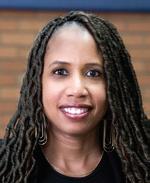
“We need more to bring about our collective liberation from a past that is fraught by discrimination and a present that is beleaguered by bias,” she said. “The more we need, I posit, can come in large part through corporate action and corporate diversity, equity and inclusion programs.”
Jones argued that corporations have the power to change hearts and minds, set new standards and expectations for society at large.
“More and more of them are listening and acting—actually changing policy and practice inside and then going out and taking public stances.”
Of course, corporations—created to produce profit—may not always drive social progress of their own device. Sometimes, it takes a push from within.
Employee activism is familiar territory for Abhinav Gupta, an associate professor of management and Michael G. Foster Endowed Fellow. He cited a recent survey that found 75% of
corporate employees believe they are right to speak out against their employer, and 38% have engaged in activism themselves—on climate change, gender pay equity, diversity and inclusion, LGBTQ+ rights, animal welfare, and more.
Drawing from a career examining the causes and effects of organizational ideology, Gupta identified a set of best practices for employees who wish to drive meaningful change from the inside—without doing harm to their own careers:
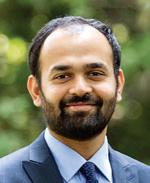
• Know the organization – leverage your unique understanding of formal power hierarchies and informal social networks.
• Frame the issue – communicate the problem, why it matters and the most effective solution.
• Repurpose resources – find creative ways to deploy limited time, money and people-power.
• Leverage benchmarks – position social action as a competitive advantage.
The strategies of this “playbook” are inexpensive and straightforward, Gupta says. “Yet they can allow employees to get what they want without antagonizing their employers. In so doing, they can allow employee and employer to come together to create social good.”
When interacting with groups online, are we more likely to speak our minds or follow the crowd?
Ann Schlosser, a professor of marketing and Evert McCabe Endowed Fellow, has investigated this dynamic over the history of the commercial internet.
In the early years, she established our tendency to be more authentic online—freer to share unique ideas, beliefs and opinions, regardless of their reception by the group. But that was back when the Internet conveyed a sense of anonymity.
Today, our online presence is anything but anonymous. Likewise, Schlosser has found that our inclination to speak freely online has receded. Within the modern Zoom meeting, discussion board or Teams chat, we are more likely to suppress unique opinions and ideas, and present a version of ourselves that will be accepted. Liked
The reason, Schlosser said, is rooted in the fundamental human desires to belong, to be validated and to see ourselves in a favorable light.
“As more and more people say what is common and what seems to be popular,” Schlosser said, “the pressure to suppress and silence unique information intensifies.”
When working remotely, she suggested encouraging team members to share their unique perspectives by asking for specific information or input, inviting and validating diverse and unique perspectives and ensuring that those who express them feel good about themselves afterward.
Mindfulness meditation is becoming big business. Across the Western world, people have taken to this calming ritual as a balm for the stresses and strains of modern life. Corporations have adopted it as an inexpensive means of reducing anxiety and increasing productivity.
Does mindfulness deliver?
Yes… when used appropriately, according to Andrew Hafenbrack, an assistant professor of management and organization who studies the effects of mindfulness programs in the workplace.
Meditation should be considered an aspirin pill, not a panacea, he cautioned. Most effective for use in certain situations.
“Though many think you have to meditate for 45 minutes every day to get benefits, small amounts of meditation in specific situations can change your life—often for the better, but occasionally for the worse,” Hafenbrack said. “You just have to know when it is helpful and when it isn’t.”
Mindfulness can support tasks that require focus on the present without distraction, calmness, positive emotions or self-awareness. But mindfulness can hinder tasks that require focus on the past or future, high energy, negative emotions or thinking about other people.
There is, Hafenbrack asserted, at least one universal benefit of mindfulness meditation: “It’s a powerful tool to help us turn our minds off at the end of the day to fall asleep.”
Ryan Fehr introduced one of the least expensive, most expansive interventions that can create a healthier workplace: cultivating gratitude.
Fehr, an associate professor of management and Michael G. Foster Endowed Fellow, cited polls confirming a chasmic disconnect between our willingness to express gratitude at work and our wish to feel appreciated.

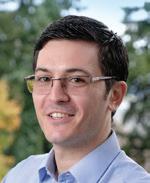
“There’s a pretty big gap between the amount of gratitude that we hope to see in the world,” said Fehr, “and the amount of gratitude that actually exists.”
To bridge that gap, he framed a solution on inward and outward pillars.
Inward pillars include understanding the impact, building a habit of reflection and sharing gratitude conversations with others.
Outward pillars include understanding that appreciation (valuing the person as a whole) is greater than recognition (which is transactional), showing appreciation in many ways (affirmation, quality time, acts of service, even tailored gifts on occasion), and accepting gratitude from others with grace.
“If you’re looking to cultivate gratitude as a leader in an organization, it’s very important to set the tone,” Fehr said. “Number one, you have to treat employees with dignity and respect. Number two, you have to be a role model, showing gratitude and expressing appreciation yourself.” n
See videos of Foster Insights at magazine.foster.uw.edu.


The Foster School of Business welcomed seven new tenured or tenure-track faculty members this year. Some are proven stars, others newcomers with enormous promise. Here’s a closer look.
Wanning Chen
Assistant Professor of Information Systems
Earned her PhD from Stanford University
• won the Pomona College Math Prize • studies learning and decision-making in high-dimensional statics, matrix-shaped data and sequential decision-making • teaching Database Management at Foster • Fun fact: once afraid of animals, she now happily lives with a ragdoll cat.
German Gutierrez
Assistant Professor of Finance
Earned his PhD from New York University • received the Yuki Arai Prize at NYU • formerly a principal and consultant at Oliver Wyman
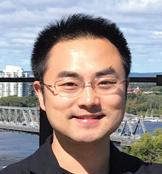
• studies industrial organization, macroeconomics, finance • teaching Competing in the Global Economy at Foster • Fun fact: he is a hiker and surfer who regularly does silent meditation retreats.
Mana Heshmati
Assistant Professor of Strategy and Entrepreneurship
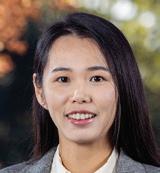

Earned her PhD at the University of Michigan
• received the Outstanding Reviewer Award from the Academy of Management Strategy Division • won the Spivey/Hall Award for Academic and Research Excellence at Michigan • formerly worked as a product developer at the Ford Motor Company • founder of Peace Meal Kitchen • studies managerial cognition, strategic decisionmaking and technological innovations • teaching Strategic Management at Foster • Fun fact: she has lived in 10 different cities and rode a motorcycle for seven years.
Charles Lee
Kermit O. Hanson Professor of Accounting
Earned his PhD at Cornell University • joined Foster from Stanford University, where he was the Moghadam Family Professor of Accounting • previously served as managing director of Barclays Global Investors •
co-founded Nipun Capital, LP • co-chaired the Accounting Department at Peking University • directed the Parker Center for Investment Research at Cornell University • named the accounting “legend” in Seven Essentials for Business Success: Lessons from Legendary Professors • recipient of the Q Group’s Roger F. Murray Prize and the American Accounting Association’s Innovation in Financial Accounting Education and Notable Contribution to Accounting Literature awards • studies behavioral finance, market microstructure, equity valuation, financial analysis, quantitative investing and security market regulation • teaching Alphanomics and Marketing Efficiency and Informational Arbitrage at Foster • Fun fact: he’s preparing to become a grandpa for the first time!
Ye Li
Assistant Professor of Finance and William W. Alberts Endowed Professor

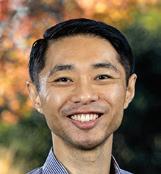

Earned his PhD from Columbia University • joins Foster from The Ohio State University • formerly an investment banking analyst at Credit Suisse • won the Outstanding Paper Award in Financial Institutions (MFA) from Wharton Research Data Services • received the S. Bhattacharya Memorial Prize from the European Finance Summit and the AAM-CAMRI-CFA Institute Prize in Asset Management • studies financial intermediation and the macroeconomy, payment systems, digital currency and platforms, and asset pricing • teaching Business Finance at Foster • Fun fact: an amateur anthropologist, he’d be a professional traveler if he could swing it.
Amandeep Singh
Earned his PhD from The Wharton School • previously worked as a trader/strategist at Goldman Sachs and a quantitative analyst at Tower Research Capital • founder of AI-building platform Revire • won a Best
Paper Award from the Production and Operations Management Society • studies digital platforms, marketplace analytics, causal learning, empirical industrial organization and econometrics • teaching Business Analytics and AI for Business at Foster • Fun fact: he’s working on his pilot’s license and dreams of sailing across the Caribbean.
Shawn Shi
Assistant Professor of Accounting
Earned his PhD from Stanford University • worked as an analyst at NERA Economic Consulting • studies the role of information and transparency in capital markets and corporate governance settings • teaching Introduction to Accounting and Financial Reporting and Accounting for Problem Solving at Foster • Fun fact: the former classics major is working to master a handstand. n
“Happy families are all alike; every unhappy family is unhappy in its own way.”
– Leo TolstoyThe famous opening line of Tolstoy’s masterpiece, Anna Karenina, packs a wallop of wisdom in its keen observation of the collective human condition.

In the nearly 150 years since its publication, all manner of scientists have tested the author’s hypothesis in numerous realms of life. Now Michael Johnson and former Foster doctoral student Wei Jee Ong (PhD 2021) have applied it to the workplace— whether physical, virtual or a bit of both.
Their conclusion? Engaged employees are all alike; every exhausted employee is exhausted in their own way.
Or, to put it another way, a common suite of needs—reasonable workload and emotional demands, plus ample resources of autonomy, social support and feedback—must be met in order for us to be fully engaged and energized at our jobs. When even one of these needs goes unmet, we tend to feel exhausted.
“Our work suggests that there are many pathways to exhaustion at work, while a single path leads to engagement,” says Johnson, the Boeing Company Endowed Professor in Business Management.
Gut reaction
Conventional wisdom had held that increasing resources could buffer the effect of overbearing demands. But surveys of professionals—conducted by Johnson and Ong before and during the pandemic—revealed no evidence of this effect. Instead, they indicated that all the resource and demand conditions needed to be satisfied in order to achieve engagement.
And no amount of autonomy or feedback or support—or even extra compensation—will prevent exhaustive burnout in someone who is chronically overworked or emotionally spent.
The researchers found that the same combinations of factors that hasten burnout also trigger physical ailments and intentions to quit.
For organizations that wish to foster care, passion and purpose as a path to profit without burnout, Johnson says the first step is finding out how employees perceive the demands and resources they experience at work. A well-designed, personalized survey repeated at regular intervals is a good place to start.
“If you’re trying to keep your employees from becoming exhausted, sickened by stress and wanting to quit, then you need to figure out why they are exhausted,” Johnson says. “If you want employees who are engaged and happy to stay, then you need to give them reasonable workloads and emotional demands, and high levels of autonomy, social support and feedback. You need to work on all these factors.” n
Foster Faculty recognized for outstanding achievements over the past year
Darren Bernard, an associate professor of accounting and John B. and Delores L. Fery Faculty Fellow, received the PACCAR Award for Excellence in Teaching.
Elizabeth Blankespoor, an associate professor of accounting and Marguerite Reimers Endowed Faculty Fellow, won the Best Paper Award at the Review of Accounting Studies Conference.
David Burgstahler, the Julius A. Roller Professor of Accounting, received the Seminal Contributions to Accounting Literature Award from the American Accounting Association.
Alicia DeSantola, an assistant professor of management and organization, was named one of the world’s “Top 50 Undergraduate Business Professors” by Poets & Quants.
Suresh Kotha, a professor of management and the Oleson/Battelle Excellence Chair in Entrepreneurship, received the Helena Yli-Renko Research Impact Award from the USC Greif Center for Entrepreneurial Studies.
Terry Mitchell and Tom Lee, emeritus professors of management, shared the Thomas A. Mahoney Mentoring Award from the Human Resources Division of the Academy of Management.
Robert Palmatier, a professor of marketing, earned the Sheth Foundation/Journal of Marketing Award, the William R. Davidson Award, and the Leonard L. Berry Marketing Book Award for his seminal work on data privacy.
David Sirmon, a professor of management and the Robert Herbold Professor in Strategy, won the Best Paper Award from the Academy of Management Review
Yong Tan, the Michael G. Foster Endowed Professor of Information Systems, was ranked #1 in the AIS global index of most productive information systems researchers.
Yingfei Wang, an assistant professor of information systems, received an Amazon Research Award to support her research on video “outstream” advertising.
Yong-Pin Zhou, a professor of operations management and Evert McCabe Endowed Fellow, received the INFORMS Service Science Best Paper Award.
Find the complete list of faculty honors at magazine.foster.uw.edu.
Work-related anxieties can invade your nighttime dreams—and wreck your next day on the job
It’s one thing to take work home with you (or, as is so often the case these days, to work at home). But when job-related anxieties invade your overnight dreams, they can wreck your mood the next morning, too.
This ability of dreams to convey negative emotions from workday to workday is examined in a paper by Christopher Barnes, a professor of management and Evert McCabe Endowed Fellow at Foster.
While most of us look to sleep as the ultimate refuge and respite, the study determines that stressful work experiences incite pre-sleep rumination—our tendency to gnaw on the trials of the day before nodding off—which affects the emotional tone of dreams during the night. This tone continues to dictate our mood the following morning.

In effect, dreams can turn one bad day at work into another bad day at work. Which means that sleep is not always a positive form of recovery.
“Dreams,” Barnes says, “play an important role in how work stressors experienced in a given workday are associated with mood the next morning.” n
Special purpose acquisition companies often project overly optimistic financial forecasts
Investors are always seeking potential. The more specific, the better. And special purpose acquisition companies—better known as SPACs—deliver Potential, that is.
As they raise money to acquire or merge with an existing private firm, these “blank check companies” often issue long-term forecasts projecting the financial performance of their targets.
But SPAC projections tend to be overly optimistic, according to new research co-authored by Elizabeth Blankespoor, an associate professor of accounting and Marguerite Reimers Endowed Faculty Fellow at Foster.
From 2000 through 2021, nearly two-thirds of SPACs with observable outcomes failed to meet or beat their projections, the study found. And SPAC projections were three times larger, on average, than the actual revenue growth of comparable public firms.

“Whether it’s due to more legal freedoms or investor expectations, overly optimistic projections have arisen in the SPAC environment,” says Blankespoor. “And if investors are not savvy enough to realize this, then there is a potential for decisions made on imperfect information.” n

Remote work makes organizations more siloed, but that’s not necessarily a bad thing
Across the globe, the COVID-19 pandemic created an unplanned natural experiment in widescale remote work.
Awakened to the efficacy and economy of a distributed work force (and the desire of some workers to continue Zooming in), many organizations plan to allow remote work—to some degree—permanently.
But remote operations have some unintended side effects. One of the biggest is that employees become more siloed, according to new research by Emily Cox Pahnke, an associate professor of management and organization and the Lawrence P. Hughes Endowed Professor of Innovation and Entrepreneurship at the Foster School.
Her team’s analysis of 360+ billion work emails sent in 2019 and 2020 reveals that employees tended to split into more isolated and well-defined communication networks during the emergency work-at-home orders that dominated most of 2020. These more modular networks became more dynamic, too, with less stability of membership.
But the study finds an upside to this phenomenon: more intensive internal communication within these increasingly disparate silos. This intensity of interaction may drive innovation and efficiency, says Pahnke.
“The increased siloing we observe,” she adds, “need not be feared.” n
Doctors should be specific when conveying the risk of treatment complications
Complications of medical treatments can be a matter of life or death.
So, understanding risk is of the utmost importance to patients weighing their medical options.
Those patients are best served by their physicians using quantitative rather than qualitative terms to describe the risk of complications, according to a new study by Nidhi Agrawal of the Foster School and a consortium of researchers from UW Medicine.

In other words, patients have an easier time drawing accurate conclusions when the risk is presented as a numerical percentage rather than with less precise terms such as “common,” “uncommon” or “rare.” And a specific percentage point estimate is more effective than a range.
“This finding highlights the importance of how risk is communicated to patients if they are to make informed decisions about their care,” says Agrawal, the Michael G. Foster Professor of Marketing.
Based on the study’s insights, the research team at the UW Decision Science Group plans to develop tools— such as handouts and decision aids—to help healthcare providers convey risk information to patients more effectively. n
In challenging times, a culture of collective empathy is key to keeping employees authentically engaged The start of the COVID-19 pandemic brought a lot of uncertainty.

While individuals were trying to make sense of the pandemic on a personal level, the companies they worked for were trying to figure out how to survive.
“What is most helpful during times like this is for employees to voice their opinions so that organizations can make difficult, complex decisions better,” says Elijah Wee, an assistant professor of management at the Foster School. “Yet, employees are less likely to share their ideas during a disruption because they view it as risky. It’s kind of a paradox.”
How can organizations support employees so they feel comfortable speaking up during times of disruption? The answer is collective compassion, according to Wee and Ryan Fehr, a professor of management and Michael G. Foster Endowed Fellow, who studied the fortunes of a hotel chain during the pandemic.
Where a team-wide culture of compassion was present, the individual employees suffering most from the pandemic were more likely to speak up and participate.
“By shifting the focus to the collective,” Wee adds, “the effect of compassion is amplified as a team norm to support each other during widespread disruption.” n
Social media platforms need to do more to protect kids from rampant— and viral—toxic comments
The Internet can be a toxic hangout— especially for kids.

New research from Uttara Ananthakrishnan reveals that hateful commentary on social media content posted by minors is both rampant and viral.
Her analysis of 110 million responses to YouTube videos created by children and teenagers reveals that 1 in 20 of those comments is insulting, obscene, threatening or hateful.
Moreover, hateful quickly goes viral. When one toxic comment is posted, the likelihood increases that others will follow.
“We observed more than just the upfront cost of one offensive comment,” says Ananthakrishnan, an assistant professor of information systems at Foster. “When one person starts saying hateful things, they break societal norms of civility— and things can devolve very quickly.”
The biggest target of toxic commentary appears to be preteens, who are particularly vulnerable emotionally.
But this descent into toxicity is not inevitable. Ananthakrishnan says that social media platforms like Instagram, TikTok and YouTube all possess the AI technology to automatically scan, flag and conceal potentially hateful comments for human review—before they pollute the comment sections of modern kids just living online.
They simply need to deploy it. n
the business of human relations at FTD, Charlie Cole leads a legacy brand into a brighter future
remotely, he scheduled one-on-one video conferences with 300 FTD employees with no agenda other than getting to know the people and culture of the company.
Art of the turnaround Building relationships and trust would prove essential to transforming FTD after its 2019 bankruptcy, which had allowed the company to remain operational but took a toll on employee morale.
served as global chief e-commerce officer at Samsonite luggage. But selling flowers has a unique set of logistical challenges. “If you have that formative e-commerce experience, to some extent it doesn’t matter if you are selling coffee or luggage or flowers,” he says. “But the supply chain challenges that come with this business are unlike anything I’ve ever seen… we are selling something that if it’s too hot, it wilts, if it’s too cold, it freezes.”
After improving its operations and fulfillment logistics on the back end and the user experience on its e-commerce front end, Cole took the company on offense, launching a rebrand and advertising campaign.
Charlie Cole (BA 2004) was ready for a challenge.
He was set to move his family from Seattle to Chicago to become the CEO of FTD, the nationwide floral company. He was undaunted by the transition to a different industry and prepared for the challenges of leading a century-old brand that had recently emerged from a difficult bankruptcy.

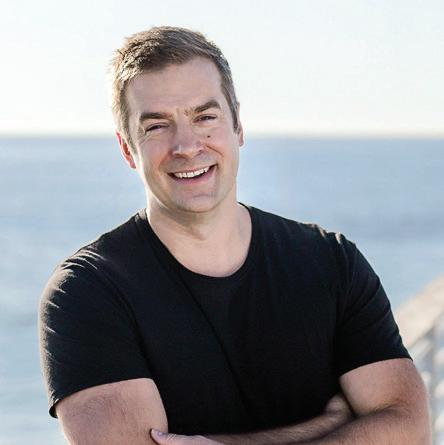
What Cole was not ready for was doing all this just as the nation locked down in response to the COVID-19 pandemic. “Nothing could have prepared me for starting on March 23rd, 2020. I think that’s the only honest truth for any leader at the time,” he says. “One of those words that we have a tendency to overuse is ‘unprecedented.’ But I don’t think there were a lot of e-commerce-driven businesses when the Spanish flu pandemic hit (in 1918). This truly was an unprecedented challenge.”
These unique circumstances forced Cole to take a different approach, one that, in retrospect, he feels was remarkably beneficial. While forced to lead
“A bankruptcy turnaround job is so interesting because it’s not just the nuts and bolts of the business, but it’s also a cultural reinvention,” Cole says. “You have a team that had that word, bankruptcy, hung around their neck. And with that comes a whole lot of anxiety and fear. So, for me, it’s all about building this culture the way we want it to be.”
Cole and his team got to work. A key aspect of FTD’s transformation was optimizing its industry-leading fulfillment capabilities. Though the company was founded in 1910, FTD is now a technology company, routing online orders to a network of local florists using an advanced algorithm to ensure the fastest and most efficient delivery.
The e-commerce aspect was familiar to Cole, who had previously
This national splash also conveyed the company’s bedrock value of inclusion— including overt support of LGBTQ+ rights. “I think every brand needs to stand for something,” he says. “We believe that love is love.”
Life, death and everything in between With confidence in FTD’s team, technology and tactics, Cole has been setting a course for the company’s future. He envisions expanding FTD’s product offerings, vast network of small businesses and superior same-day fulfillment capabilities to enable delivery of, say, a bouquet curated by a local florist plus the best croissant in New York City.
“That is much more meaningful than something that is pre-packaged and shipped via UPS,” he says.
“I would love it if everything we did was fulfilled locally by small businesses. Because, at our core, what we are is gifts… across the paradigm of emotions from life and death, birth and funeral. It’s amazing to think about. It sounds dramatic to say life and death, but in our case, it is actually true.” n
— David Fenigsohn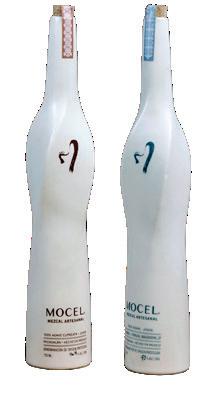
Mendoza grew up in Washington’s Yakima Valley, often visiting family in Michoacán, an agricultural and culturally rich state located in west-central Mexico.
often the only woman or person of color in the room—Mendoza began developing the Mocel brand on the side with her sister. At the end of 2019, Mendoza left her job to pursue the venture full-time, taking a significant but measured financial risk.
Latinx culture is everywhere on the global culinary scene. It is now common to see ancient Latin grains, citrus-cured seafood and spicy cocktails on the menu. Sales of salsa have eclipsed ketchup.
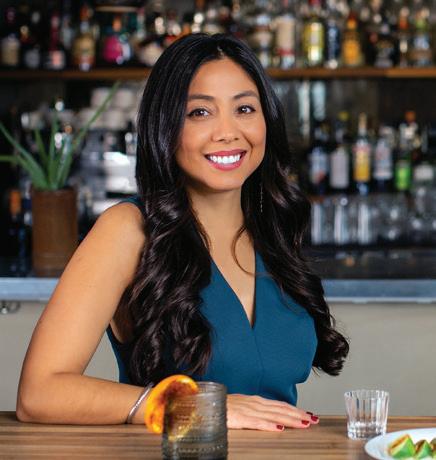
But the farm-to-table concept that is integral to Latin American cuisine has also made a big comeback in the US. Conscious consumers want products they can trace and connect with.
Enter Mocel, a new ultra-premium arti sanal mezcal from Michoacán, Mexico. It was created by Rosalinda Mendoza (MBA 2015) and her sister Elizabeth Mendoza as a brand that honors the people—their people—who have preserved the tradition of artisanal mezcal.
“We have an opportunity to influence and inform consumers about the incredible history of mezcal in a way that honors the process,” says Mendoza. “At Mocel, we are passionate and committed to helping foster a mezcal culture in the US that considers the people, the land and the way it connects us together.”
As a kid, she labored in the fields alongside her family of immigrant farm workers. But Mendoza’s family instilled in her the importance of education. The eldest of five siblings, she was the first in her extended family to attend college. She earned a BA in economics from Whitman and worked in the nonprofit sector before joining the MBA Program at the Foster School of Business.
“I always knew that I wanted to start my own business,” she says. “But Foster really opened my eyes to what was possible.”
Mendoza’s involvement in the Buerk Center for Entrepreneurship was the turning point for her—especially the angel investing course.
“This concept of angel investing was new to me and to see the other side was incredible,” she says. “Foster gave me the opportunity to witness something I would have never had access to.”
While working after graduation in the tech industry— where she was
Of course, no one could have predicted a global pandemic and the economic turmoil it has wrought. But with family support and careful planning, the Mendoza sisters were able to move forward with their artisanal mezcal company.
Mocel mezcals are made of only two ingredients: water and agave, which develops the spirit’s signature smokiness while baking in volcanic pits over many days before a long fermentation and then distillation in a wooden covered Tarascan still, unique to Michoacán artisanal mezcals. They are packaged in exquisitely crafted ceramic bottles that celebrate the artistry of the region’s indigenous Purépecha people.
“Our process is time-intensive and time-honored,” says Mendoza. “We don’t use additives or anything to speed up the process. It’s wild fermentation using natural yeast from the air and the wood.”
Mocel has been successful from the start, nearly selling out of its inaugural batch of mezcal and accelerating 2023 production.
As a trailblazing woman in tech and spirits, Mendoza hopes her dedication and hard work will inspire women in business and the next generation of entrepreneurs of color, who often face biases and lack resources to compete on a level playing field.
“I want them to see the possibilities and provide equitable access to the startup community,” she says. “Our community is very entrepreneurial. However, a lot of the time you don’t know or don’t have access to the ways that you can scale it to make your business possible.” n
— Melissa BorgesBetti Fujikado (BA 1977) is a dynamo for positive change. A Japanese American whose parents were incarcerated during World War II, Fujikado rose to co-found— and lead as CEO for 23 years—the Seattle advertising agency Copacino Fujikado, which has earned multiple Ad Age awards for its work with an A-list of clients that includes the Seattle Mariners, REI, Chateau Ste. Michelle, Seattle Aquarium and Seattle Children’s Hospital.
More recently, she established Success Cohorts, a community-building organization that provides coaching to first-generation college graduates. A longtime community leader and Foster MBA mentor, Fujikado also helped launch the Democracy Cup with Seattle Unite, a coalition of sports and cultural organizations that encouraged communities of color to participate in the 2020 census and elections. And, in response to escalating anti-Asian hate during the COVID-19 pandemic, she co-created the oral history project “Our Stories Are Your Stories,” in partnership with Wing Luke Museum.
Fujikado, recipient of the Foster School’s 2022 Distinguished Leadership Award, discussed her life’s work to reverse racism and build community with recent Foster Evening MBA grad Cameron Boyd (MBA 2022), a talent management specialist at The Boeing Company who performs with the Seahawks Dancers on the side. Here is an edited excerpt of their conversation.

Cameron Boyd: What was your childhood like?
Betti Fujikado: I grew up in an idyllic, middle-class, Japanese American family in Skyway, Washington. As the second oldest of four daughters, I took the role of feisty and competitive. I wasn’t competitive with other people, but definitely always wanted to do my best to make my parents proud.
My grandparents emigrated from Japan in the early 1900s. My elementary school experience included teasing about having slanted eyes and hearing things like “shoot that Jap” and “stay away from her, she’s the enemy.” My classmates’ parents had been a part of the war and my parents had been incarcerated under Executive Order 9066 at Camp Minidoka. It was hurtful and confusing for a six-year-old. I’m grateful to my family and sisters for providing a place of love and support. No one was going to mess with the Fujikado sisters! My competitive nature made it so that even if it hurt, it wouldn’t break me.
What kind of impact did this incarceration have on you and your family?
My parents’ outward reaction to incarceration was typical of many Japanese Americans in that they encouraged us to “work hard, put your head down, and don’t rock the boat.” They didn’t talk to us about those years until our adulthood… My viewpoint is very different—we need to talk about it, reflect on its significance, and make sure it doesn’t happen again. I support and admire a nonprofit called Densho that has captured the stories of Japanese American elders who were unjustly incarcerated. Densho is a Japanese term meaning “to pass on to the next generation” or to leave a legacy. Interestingly... I’m also of an age that was in the second wave of feminism, the Civil Rights Movement, and Title IX passed in my senior year of high school. It was an interesting mix of life experiences that influenced who I am today.
I admire the way that you invest so much time and energy into righting the wrongs of systemic oppression. How does establishing a sense of community combat hate and violence?
A community for me is where we feel like we belong. I believe if I sit down with anyone in this city, I can figure out what our shared community may be and how we share space there. If we find that shared community, we can establish a shared trust that starts us on the path of a productive conversation. There may be things we violently disagree on, but we’ll get to those later. Let’s establish that place of commonality first and then let’s keep talking. I encourage everyone to think of their communities and how they can more actively engage in them. n
To read the complete interview, visit magazine.foster.uw.edu.
Foster grad Dylan Teves continues business on the pitch with Seattle Sounders FC
You could chart the career of Husky men’s soccer star Dylan Teves (BA 2021) as a jagged massif of ever-ascending peaks. All-American. Academic All-American. Finalist for the MAC Hermann Trophy. First player to score consecutive hat tricks in the NCAA tournament. First UW soccer team to vie for a national championship…
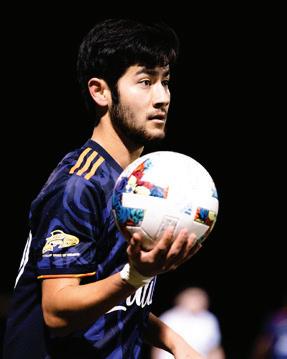
Now Teves is aiming even higher with Seattle Sounders FC.
As a young teenager, his family moved from Hawaii so he could train with the Sounders Academy. At the UW Foster School, he demonstrated the same excellence studying finance that he did on the pitch.
Weeks after the close of a magical senior season with the Huskies (and early graduation), Teves signed with the Sounders—the culmination of a lifelong dream. Another goal achieved, an even greater challenge set for the versatile midfielder with serious finance chops.
Gates Foundation veteran Alexa Bednarz brings sustainable shelter to India
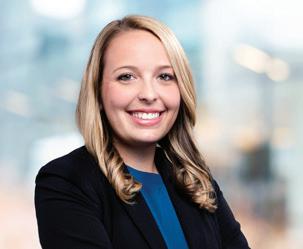
Austin Hirsh turns misfit produce into drinkable meals as healthy as they are delicious
Austin Hirsh (MS 2020) doesn’t suggest you try his smoothies because they’re healthier than sugary beverages or reduce food waste. He suggests you try one because they taste great.
“At every level, you have to prove yourself,” he says. “Going through the academy, the UW and now the biggest jump to a professional team. There’s a lot of excitement and a lot of hard work ahead in these next months and years.” n
— Ed KromerIn India, where temperatures regularly exceed 110 degrees, Alexa Bednarz (BA 2012) is introducing a revolutionary roofing material that is lightweight and low-cost yet strong and durable. And, crucially, it keeps homes far cooler than conventional steel or asbestos cement sheets.
What is this miraculous material? Bamboo, an abundant renewable that grows naturally throughout the world’s warmest climates.
Bednarz is the founder and CEO of Eco-Shelter, a social enterprise advancing the use of bamboo mats for roofing in India and beyond. Eco-Shelter has been awarded $1 million from the National Science Foundation and is partnering with WSU’s Composite Materials & Engineering Center on product development, various nonprofits and NGOs on expanded distribution, and microfinance institutions on access to loans.
It’s a for-profit company, but with a guiding social and environmental mission. “Building materials are one of the biggest contributors to greenhouse gases,” says Bednarz, an alumna of Foster’s Jack and Ann Rhodes Professional Sales Program and veteran of the Bill & Melinda Gates Foundation. “By using bamboo, we are taking captured carbon and putting it into a long-life-cycle material.”
— David FenigsohnHirsh is the CEO and co-founder of The 2050 Company, a startup with the mission of converting what would otherwise be wasted produce into new products. He sources natural fruits and vegetables from the excess inventory of farms, then freeze-dries them into powdered mixes that can be stored for months and shipped economically around the country before being reconstituted with water and ice into a delicious and nutritious drinkable meal. No preservatives or sweeteners needed.
“A lot of sustainable products are less convenient than the everyday version—or they don’t taste as good,” says Hirsh, an MS in Entrepreneurship grad who won third prize at the 2020 Dempsey Startup Competition and first at the Northwest Entrepreneur Competition. “The key to convincing people to make sustainable changes to their diet and lifestyle is to provide a product that is more convenient and tastes just as good.” n
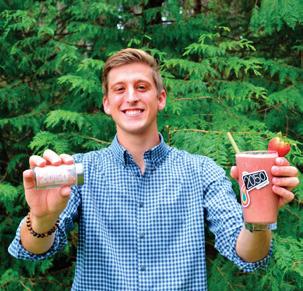 — David Fenigsohn
— David Fenigsohn
Foster undergrad Michelle Harte manages school, work and Dubs on the side
“Dubs is such a big sweetie,” says Michelle Harte, a senior at the Foster School of Business.
It’s a sentiment she shares, no doubt, with thousands of fellow Huskies and hundreds of thousands of UW alumni regarding the living, breathing emblem of the school they adore.
But Dubs is much more than a mascot to Harte. Since the end of her first year at the UW, she has worked as a handler of the school’s top Dawg, whom she describes as both a good boy and the consummate professional.
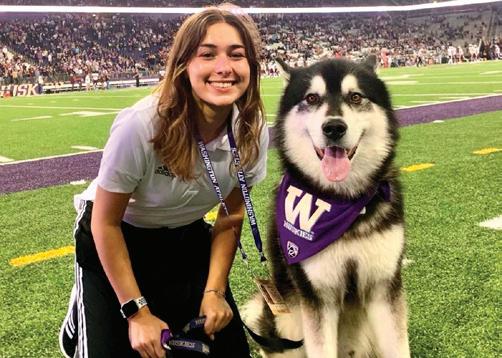
“When I first started working with Dubs, I could tell how much he loves his job (and the treats that come with it),” she says. “He’s super-intuitive and always picks up on different signals. A great example is football gameday.”
You’ve heard of “Beast Mode?”
“When it’s time for the run-out,” Harte adds, “Dubs just knows it’s time to go into focus mode.”
Focus is also key for Harte as she juggles a rigorous academic load in finance and marketing at Foster, an internship at PACCAR, a part-time job supporting the school’s Advancement team, and managing the affairs of an 80-pound Alaskan Malamute, who happens to be the most in-demand celebrity on campus.
The latter is a true calling for Harte, a lifelong animal lover who grew up caring for a dog and cat and volunteered at a center for equine therapy while in high school.
“Knowing that my experience working with animals would likely help me succeed in the role, I decided to apply,” she says. “The rest is history.”
Now a veteran of the student handler team, Harte manages Dubs at two or three events per week—more during the busy football season (“Gamedays are go-go-go”) and spring/graduation season. “Dubs,” she says, “is a busy dude.”
She is ever by his side as he rallies crowds, sparks purple pride and poses—with preternatural patience—for pictures with partisans. Harte manages the details and makes sure her famous furry friend is always safe, healthy and happy.
Harte says that her mascot-handling and Foster experiences intertwine “almost poetically… The skills we learn from working with Dubs—focus, time management, team skills, to name a few—are integral to business. And the values taught at Foster apply perfectly to working with Dubs and his fans.”
A fan herself, Harte is beyond thrilled to play a supporting role in one of the greatest of Husky traditions. “One of my favorite parts of the job is watching people meet Dubs for the first time,” she says. “I love seeing the look on their face as he makes someone’s day!
“Dubs is a truly iconic part of the Husky experience, and I am beyond grateful to get to be a part of it.” n
– Ed KromerIn three extraordinary decades of teaching at the Foster School, Jennifer Koski has informed and inspired thousands of students. But perhaps none more than Jerry Liu (BA 2011), who credits the profound learning experience in Jennifer’s entrepreneurial finance course with launching—and sustaining—his impactful career as a serial entrepreneur and investor at the intersection of tech, finance and policy.

Only a decade out of Foster, Jerry decided to give back. With impact. So, he created The Jennifer Koski Honorary Scholarship for Academic Excellence, which will provide future Foster students the opportunity to experience their own indelible education from world-class teachers like Jennifer.
You can join Jerry in supporting the Foster community—through student scholarships, experiential learning or faculty support. Together, let’s better humanity through business.
foster.uw.edu/give
